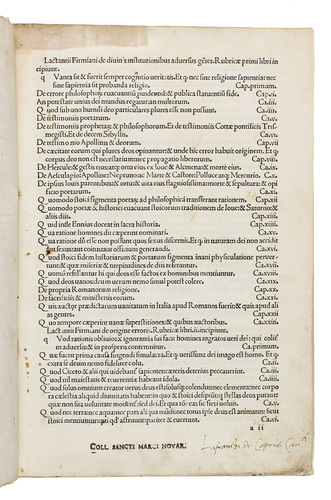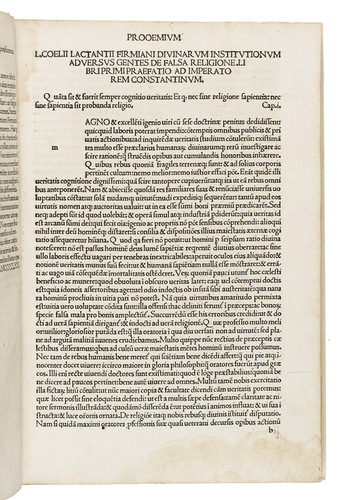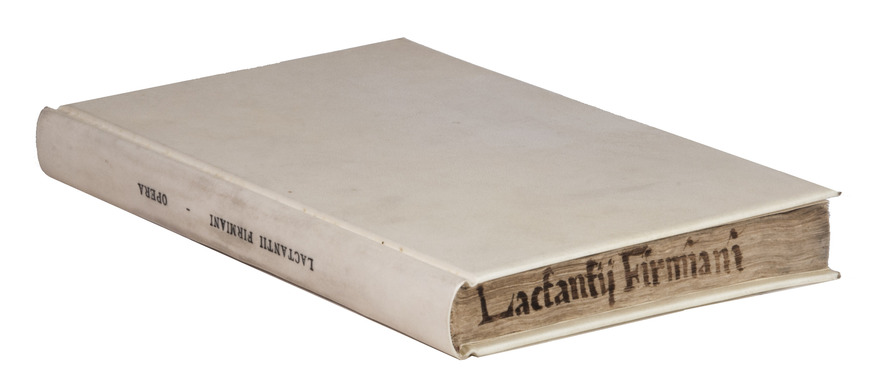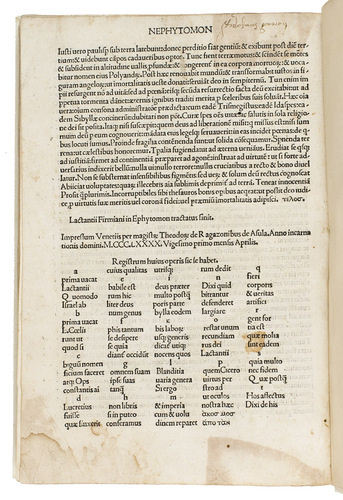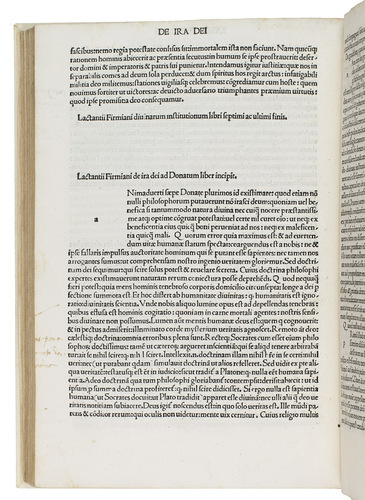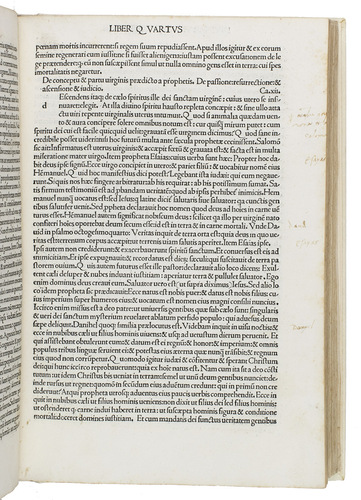LACTANTIUS, Lucius Caecilius Firmianus and Giovanni Andrea BUSSI) (editor) [and others].
Opera [and additional works].
Comprising:
(1) LACTANTIUS, Lucius Caecilius Firmianus. De divinis institutionibus
(2) LACTANTIUS, Lucius Caecilius Firmianus. De ira Dei.
(3) LACTANTIUS, Lucius Caecilius Firmianus. De opificio Dei.
(4) LACTANTIUS, Lucius Caecilius Firmianus. De phoenice carmina.
(5) LACTANTIUS, Lucius Caecilius Firmianus. [Epitome divinarum institutionem]. Nephytomon.
Additional works:
(6) RAUDENSIS, Antonius. [Lactantii Firmiani errata].
(7) GENUENSIS, Adam. His carminibus frater Adam Genuensis increpat fratrem Antonium. [Incipit:] Hic male corripuit stolidis Antonius aussis.
(8) BUSSI, Giovanni Andrea. Ioannis Andreae episcopi Aleriensis ad Paulum secundum Venetum pontificem maximum epistola.
(9) OVIDIUS, Publius Naso. Metamorphoses (extract).
(10) ALIGHIERI, Dante. Comedia, inferno XXV (extract).
(11) FORTUNATUS, Venantius. [De christi resurrectione]. [Incipit:] Lactantii fir. de resurrectio[n]is dominicae die/ [S]alve festa dies toto venerabilis aevo.
(Colophon:) Venice, Theodorus de Ragazonibus, 1390 [=1490]. 5 works and 6 additional texts in 1 volume. Folio. The text is set in Roman type with some incidental Greek.20th-century goatskin parchment, with the author and title stamped on the spine with black foil, the name of the author added in manuscript on the bottom edge of the book block. [1 blank], [147] ll.
€ 6,000
First Venice edition of Lactantius' most important works, edited by Giovanni Andrea Bussi (Joannis Andrea, bishop of Aleria, 1417-1475). Lucius Caecilius Firmianus Lactantius (ca. 240-ca. 320) was a rhetoric of Berber origin, who converted to Christianity and became an advisor to Emperor Constantine I and tutor to his son. He was one of the very first Christian apologetics and wrote works explaining Christianity in terms that would be palatable to educated people who still practiced the traditional religions of the Empire, while defending Christian beliefs against the criticisms of Hellenistic philosophers. For unknown reasons, Lactantius was considered somewhat heretical after his death and it was therefore forbidden to read and study his work. It was only copied and printed in the 15th century, when the early humanists took a renewed interest in him for his elegant writing style and called him "the Christian Cicero". Bussi, who was a humanist and the bishop of Aleria (on Corsica), edited Lactantius' work. Bussi's edition was first printed in Rome in 1470. This is the second edition.
De divinis inistitutionibus ("The divine institutes"), written between 303 and 311, is the most important of the writings of Lactantius. It is one of the earliest Christian apologetic texts and was intended to point out the futility of pagan beliefs and establish the reasonableness and truth of Christianity. As was common in the early editions of The divine institutes, it is here combined with 4 other works by Lactantius and 6 fragments of texts from other authors.
With occasional annotations in the margins. The first blank leaf is coated and shows some blind guide lines for possible text, further with a small wormhole and some staining. With a brown stain in the blank top margin of leaves a2r-v and small rust spots in the inner margin, with very minor loss of text (three letters affected). Further with a water stain in the bottom outer corner of leaves b2r-d8v and the head and foot margins of leaves t1r-t4v, barely affecting the text. Slightly foxed and browned throughout with occasional very small wormholes. Otherwise in good condition. Goff L-10; GW M 16563; Hain-Copinger 9815; IDL 2870; ISTC il00010000; Proctor 5262.
Related Subjects:






